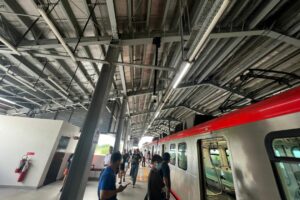MPIC’s plan to exit LRT-1 seen raising questions on PPP rail

METRO PACIFIC Investments Corp.’s (MPIC) plan to divest its stake in Light Rail Manila Corp. (LRMC), the operator of Light Rail Transit Line 1 (LRT-1), could test investor confidence in public-private partnerships (PPPs) for mass transit, as it highlights the challenges private operators face under the current fare and regulatory framework, analysts said.
“MPIC’s exit could raise questions about the long-term viability of private investment in mass transit unless fare and regulatory frameworks are recalibrated to ensure commercial sustainability,” Toby Allan C. Arce, head of sales trading at Globalinks Securities and Stocks, Inc., said in a Viber message.
MPIC said it is considering divesting its 35.8% stake in LRMC due to continued losses, with ridership yet to recover from the pandemic impact.
In the first quarter of 2023, MPIC reported that LRMC generated revenues of P595 million, a 73% increase year on year, but the operator still recorded a core net loss of P83 million, albeit 53% lower than the same period the previous year.
“We are still losing on LRT-1, in part because of COVID. Ridership went down, obviously. We continue to lose money from LRT-1, and I think we are considering selling it and getting out of the light rail,” MPIC Chairman, President, and Chief Executive Officer Manuel V. Pangilinan said on Tuesday.
LRMC’s ridership has yet to fully recover, averaging around 450,000 daily passengers in 2019, dropping to 350,000-370,000 in 2023. By November 2024, just before the opening of the LRT-1 Cavite Extension Phase 1, daily ridership was 323,000. The first phase of the Cavite Extension was projected to add roughly 80,000 daily passengers, potentially bringing ridership back up to around 403,000.
“From a strategic standpoint, exiting the light rail business could enhance MPIC’s overall profitability and capital efficiency. Rail projects, while socially critical, are typically capital-intensive and politically sensitive, offering lower margins and longer investment horizons compared to tollways and utilities — areas where MPIC has built strong competitive advantages,” Mr. Arce said.
“Divestment would allow the conglomerate to redeploy capital into higher-yielding or faster-growing ventures such as renewable energy, logistics, and digital infrastructure, which align with its sustainability and diversification goals. Moreover, shedding a persistently loss-making unit could improve consolidated earnings visibility, strengthen the balance sheet, and provide flexibility for shareholder returns or new strategic investments,” he added.
“This will improve credit and bottom-line outlook,” said Cristina S. Ulang, head of research at First Metro Investment Corp., noting that the move reflects MPIC’s agility in exiting ventures that fail to meet return targets.
“It’s a logical business decision. I believe even Ayala might have provided for their co-investment. I believe the project is long delayed because of right-of-way issues which the government is supposed to take care of,” said Edu-ardo V. Francisco, president of BDO Capital.
MPIC previously said it was reconsidering plans to acquire Ayala Corp.’s stake in LRMC following unresolved valuation issues and, last year, explored acquiring Ayala’s shares after the latter announced its divestment plan. MPIC holds its 35.8% stake in LRMC through its unit Metro Pacific Light Rail Corp., while Sumitomo Corp. owns 19.2% and Macquarie Investments Holdings (Philippines) Pte. Ltd. holds 10%. LRMC is a joint-venture company of MPIC, AC Infrastructure Holdings Corp. (a unit of Ayala Corp.), Sumitomo, and Macquarie Investments Holdings.
LRMC assumed operations and maintenance of LRT-1 in September 2015 under a P65-billion, 32-year concession agreement with the Light Rail Transit Authority and the Department of Transportation. Under the agreement, the operator may seek a fare adjustment once every two years. In April, the Transportation department approved LRMC’s petition for fare adjustments, though the new fare matrix remains below the company’s requested rates, resulting in a fare deficit of P2.17 billion.
LRMC said it has made substantial operational improvements, including the completion of Phase 1 of the LRT-1 Cavite Extension last year. The second and third phases may begin next year if right-of-way issues are resolved.
“Still, given the company’s disciplined capital allocation philosophy and the pressing need to manage return on invested capital, a divestment from LRMC appears both logical and timely,” Mr. Arce said, noting that MPIC’s exit might have reputational and strategic implications, as the rail line is one of the country’s flagship PPP projects.
MPIC is one of the three key Philippine units of Hong Kong-based First Pacific Co. Ltd., along with Philex Mining Corp. and PLDT Inc. Hastings Holdings, Inc., a unit of MediaQuest Holdings under the PLDT Beneficial Trust Fund, has a majority share in BusinessWorld through the Philippine Star Group. — A.E.O. Jose










